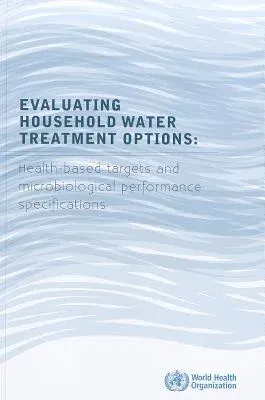World Health Organization
(Author)Evaluating Household Water Treatment Options: Health-Based Targets and Microbiological Performance SpecificationsPaperback, 1 November 2011

Qty
1
Turbo
Ships in 2 - 3 days
In Stock
Free Delivery
Cash on Delivery
15 Days
Free Returns
Secure Checkout

Print Length
68 pages
Language
English
Publisher
World Health Organization
Date Published
1 Nov 2011
ISBN-10
9241548223
ISBN-13
9789241548229
Description
Product Details
Author:
Book Format:
Paperback
Country of Origin:
CH
Date Published:
1 November 2011
Dimensions:
23.11 x
15.49 x
0.51 cm
ISBN-10:
9241548223
ISBN-13:
9789241548229
Language:
English
Pages:
68
Publisher:
Weight:
158.76 gm